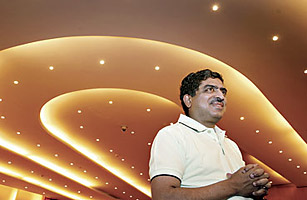
In the past 15 years, India's identity has undergone one of the biggest transformations that any country has ever experienced. It was once synonymous with poverty, snake charmers and the Taj Mahal. But stop someone on the street in the West today and say "India," and the words that come back at you are "brainy," "software engineers,'' "call centers" and "the country most likely to take my job." One of the Indian engineer-entrepreneurs most responsible for creating the new reality that has produced this new Indian image is Nandan Nilekani.
Seattle has Bill. Bangalore has Nandan. He is a founder, and currently president, of Infosys Technologies Ltd., based in Bangalore — India's Silicon Valley. Infosys, Wipro and Tata Consultancy Services are the Microsoft, IBM and Sun Microsystems of India. What makes Nilekani unique? For me it comes down to one phrase: great explainer. Yes, he and N.R. Narayana Murthy, Infosys' legendary chairman, have built a great global company from scratch. But the reason Nilekani, 50, is so sought out is that he has a unique ability not simply to program software but also to explain how that program fits into the emerging trends in computing, how those trends will transform the computing business and how that transformation will affect global politics and economics. It was his insight that the global playing field was being "leveled" by technology that inspired me to write the book The World Is Flat.
In this era of mounting complexity — with more people, systems and products entwined in a bewildering web of global networks — explaining is an enormously valuable skill. And it explains why, if you sit outside his office for a day, you notice that half the people going in are employees looking for instructions or customers looking for deals; the other half are politicians, journalists and ministers from around the world looking for an explanation of what it all means.
Friedman is a columnist for the New York Times and author of The World Is Flat